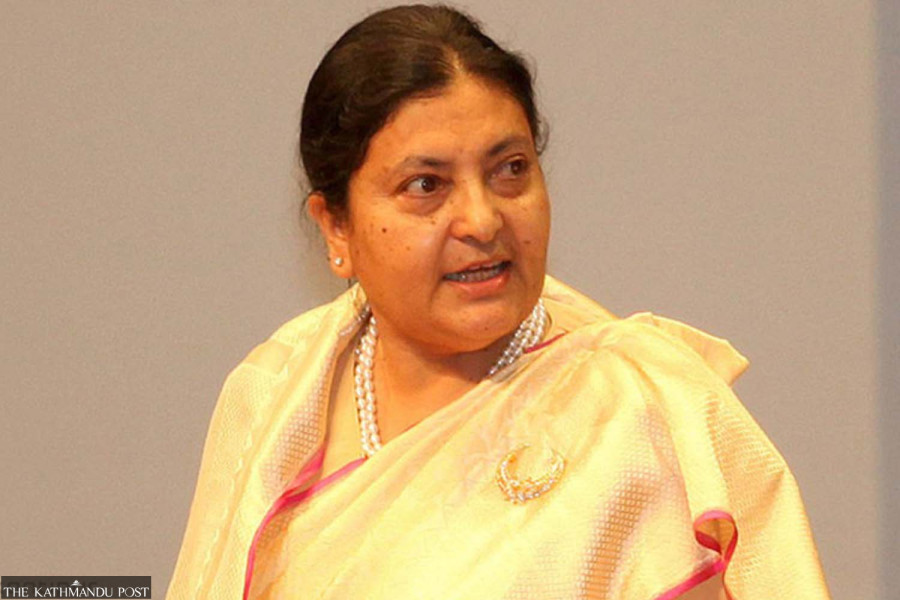National
What if President Bhandari refuses to authenticate the citizenship bill?
Those the head of state has consulted of late say that is not at all a far-fetched possibility given her ‘bruised ego’.
Tika R Pradhan
Chairman of the CPN (Maoist Centre) Pushpa Kamal Dahal, a key leader of the five-party ruling coalition, warned on Monday that parties would knock on the court’s door if the President refused to authenticate the amendment bill on Citizenship Act.
While addressing reporters in Janakpur on Monday Dahal acknowledged that the President had the right to return the bill once—but no more. He is therefore hopeful that she will authenticate it this time.
“But if she refuses, we will go to court,” Dahal said.
The recent activities of President Bidya Devi Bhandari who had returned the bill to the Parliament after sitting on it for 14 days, say observers, suggests she sees the issue of its endorsement unchanged as an affront to her ego.
On August 14, President Bhandari had returned the amendment bill to the House of Representatives for a review with her 15-point concerns and suggestions.
There is growing concern that Bhandari may not authenticate the bill. Of late, she has been consulting legal experts on whether or not she should.
Some legal experts who have met President Bhandari have said she has been in consultations with various experts ever since the bill was sent to her for authentication for the first time.
“I met the President twice before the bill was forwarded to her for the second time,” said Bhimarjun Acharya, advocate and constitutional expert. “I told the President she had only two options after the bill was again endorsed by both the Houses – either to authenticate it or resign her post. There wouldn’t be a third option.”
Article 113 (3) states that except in the case of a Finance bill, if the President is satisfied that a bill needs reconsideration, it may be sent back to the House where it originated along with a message information within 15 days of receiving it.
But she will have no option, as per the constitutional provisions, to authenticating the bill if both the Houses endorse it–with or even without changes.
Article 113 (4) says if the President sends back a bill with a message and if both the Houses reconsider the bill as it was presented or with amendments, and pass it and present it again to the President, the bill shall be certified by the President within 15 days of its submission.
Some political analysts said it was wrong on the part of the President to invite the leaders of the political parties and express her concerns as the constitution does not allow any room for such activism.
Though some legal experts have offered suggestions to the President, others have refused to meet her.
According to Anup Raj Sharma, a former chief justice, he was invited for consultation on Sunday while another former chief justices Kalyan Shrestha and Min Bahadur Rayamajhi were also invited on Sunday.
“I refused to see the President for consultations,” Sharma told the Post.
Another former chief justice Shrestha, however, refused to comment and only said the President should be mindful that her actions do not impinge on the public image of her institution.
Experts who have met her on the issue of the citizenship bill claim that the President will neither endorse the bill in its existing form nor resign because there is no ‘clear provision’ in the constitution as to what will happen if she doesn’t authenticate the bill.
The experts whom President had met also claimed that she has already hinted to the leaders of the major political parties including the prime minister and the leaders including Dahal and CPN (Unified Socialist) Chairman Madhav Kumar Nepal that she will not authenticate the bill in its existing form.
President Bhandari had met top leaders of all major parties after the House of Representatives passed the citizenship bill she had returned within a day.
“After my meeting with the President, what I feel is that there is no possibility of authentication of the citizenship bill in its existing form,” said Dev Prakash Tripathi, a senior journalist, who had met the President on Sunday. “She feels some people the constitution does not even recognize decided that they would resend the bill without change.”
“The President has a strong feeling that authenticating this bill in its existing form is against national interest,” Tripathi said.
Article 113 (5) of the constitution states that the bill will become law once it is authenticated by the President.
A former brigadier general of Nepal Army, Prem Singh Basnyat, who was one of the retired army officers who met her two weeks ago, said President Bhandari was determined not to endorse the bill without changes–even if she had to quit her position.
“I found her very confident and determined on her stand not to authenticate the bill as it is,” Basnyat, who had also met the President personally, told the Post. “Even if it meant she would have to resign.”
Despite Maoist chairman Dahal threatening to take the legal route, it may take the court a long time to hear the case.
Former justice of the Supreme Court Balaram KC said the President will invite confrontation if she refuses to authenticate the bill and will most probably face an impeachment.
“If she [President] refuses to authenticate the bill, she will not only breach the rule of law and constitutionalism but also invite political chaos,” said KC.
Though the President will not be suspended if the political parties register an impeachment motion, she could be politically disgraced before her term expires.
Narayan Kaji Shrestha, senior vice-chair of the CPN (Maoist Centre), however, said the ruling parties have not even imagined a situation of the President not authenticating the bill “as she has no constitutional ground to do so.”




 18.12°C Kathmandu
18.12°C Kathmandu














